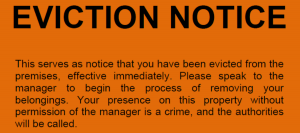Can a Landlord Evict a Tenant via Text Message?
If you’re living in a rental, chances are you’ve thought about what you would do if you were evicted. However, some people are caught completely off-guard when they are served with an eviction notice, especially if they haven’t violated the lease.
Such was the case for one tenant in Australia who “dropped the F-bomb” when her landlord left the gate open and her three-year old dog fled out into the road. Her vulgarity was not directed toward her landlord. Notwithstanding, her landlord later texted her that her swearing made him “uncomfortable” and the landlord gave her three months to move out. Faced with only three months left in her tenancy, the tenant is left wondering if she has any legal recourse against the landlord.
Can a Landlord Evict a Tenant for Using Foul Language?
State laws set out detailed requirements to end tenancy. If you live in a rent-controlled unit, you may only be evicted if there is “just cause.” None of the “just cause” evictions include a tenant’s use of profanity; instead, “just cause” can include failure to pay rent, creating a nuisance, breaking a term of the lease (such as smoking in a non-smoking unit), breaking the law, among other reasons. There are three types of termination notices that a landlord may use if he has just cause for eviction. 
Pay Rent or Quit. If a tenant fails to pay rent when due, a landlord can serve a notice to pay rent or quit tenancy. The tenant is given anywhere between 3 to 5 days to pay rent before the tenancy is terminated and the landlord can evict.
Cure or Quit. In some states, a landlord can give a tenant a notice to fix some violation of their rental agreement. Tenants who have three people living in the unit when only two are permitted may receive this type of notice. If the tenant fails to correct the violation within 5 or 10 days of notice, the landlord can begin the eviction process.
Notice to Quit. With these types of notices, the tenant is ordered to vacate the unit with no chance to correct the violation. In most states, notices to quit are allowed in only certain situations, such as being late with rent on multiple occasions, repeated violations of the lease, if the tenant engaged in illegal activity, or seriously damaging the premises.
In many states, a landlord can serve an eviction notice without giving any reason. In these states, a landlord could conceivably evict a tenant for using profanity, but not state the reason in the notice. Typically, the landlord must give anywhere between 30 to 60 days’ notice to terminate a month-to-month tenancy. However, depending on the state, notice can be as short as 20 days or as long as 90 days.
Requirements of an Eviction Notice
Different types of termination notices are required for different types of situations. Each state has its own procedure, but most states have two basic requirements.
First, the landlord must give you written notice to move out. If you have been served with a pay or quit or cure or quit notice, the notice must also include instructions on how to fix the problem within the specific time frame. If your unit is not rent-controlled, the notice needs to be either 30 or 60 days and must mention that the tenancy will not be renewed.
Second, the eviction notice must be served, or delivered, upon the tenant. There are different state rules regarding service, but generally service includes hand-delivery or mail delivery.
Back to the original scenario – if a tenant receives a notice of eviction via text message from her landlord, is it valid? In the majority of states, a text message would not qualify as valid written notice or valid service. Written notice has very specific statutory requirements, and text messaging likely does not satisfy the requirements within your state. Similarly, sending a text message is not proper service. If the tenant were living in the United States, an attorney could stop this eviction before it even began.
What our clients think
At LegalMatch, we value our client’s opinion and make it a point to address their concerns. You can refer to our reviews page if you want to know what our clients have to say about us.


Comments
Hi Erin Chan Adams,
I am a property owner in WI and I would like to know if it is legal to send the 5 day notice to my tenant via email when they don’t pay rent on the 1st of the month?
No! Google it!